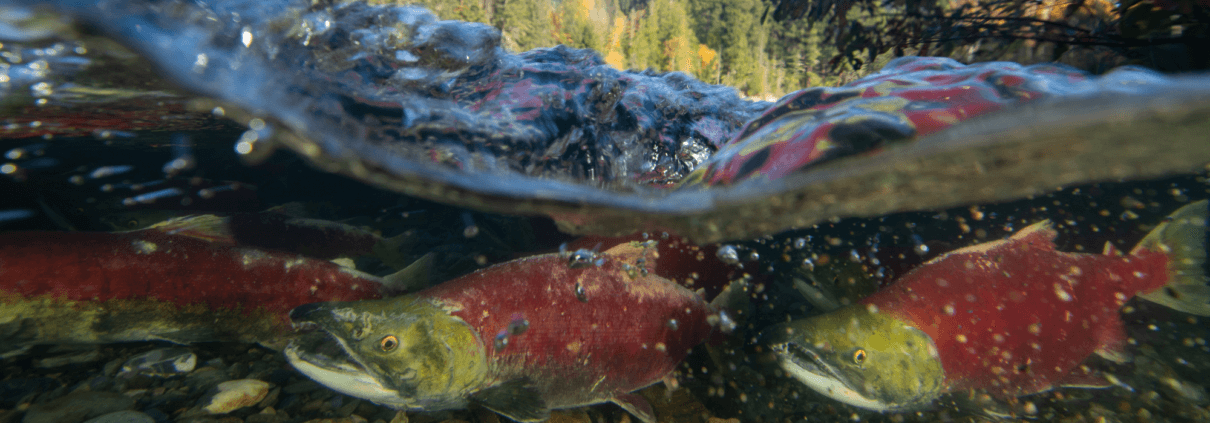Gift from Tony Allard Supports Salish Sea Marine Survival Project

Dr. Kristi Miller-Saunders with Fisheries and Oceans Pacific Biological Station is scientific lead for the Strategic Salmon Health Initiative. A partnership between the Pacific Salmon Foundation, Genome BC and Fisheries and Oceans Canada to clarify the role of pathogens in causing infectious salmon disease.
$250,000 Contribution by President of Hearthstone Investments supports efforts to restore Coho and Chinook Salmon in Strait of Georgia
Vancouver – Tony Allard, President of Hearthstone Investments, has joined a growing list of business and philanthropic leaders who have committed financial support to the Pacific Salmon Foundation’s effort to restore Coho and Chinook salmon in the Strait of Georgia. Allard has pledged $250,000 to the Salish Sea Marine Survival Project, a five-year research effort to determine the causes of major declines in Coho and Chinook salmon in the Strait of Georgia during the last 20 years.
Mr. Allard said he was inspired by another Pacific Salmon Foundation (Foundation) supporter, Rudy North, who pledged $250,000 at the Foundation’s Vancouver fundraising gala on April 30th. He said the donation builds on his years of involvement in Pacific salmon conservation projects on B.C.’s central coast where he owns and has restored the Good Hope Cannery, which was built by the Bell-Irving family in 1895. (www.goodhopecannery.com).
“During my time spent on the central coast my appreciation for our wild salmon has grown and I have learned how important they are to all British Columbians,” said Mr. Allard. “In many ways they are our legacy. Wild Pacific salmon were an important staple for our First Nations, and provided a valuable industry to our province in its early days. Today they remain a keystone species for our complex marine ecosystems, and they continue as the backbone of our commercial fishing and tourism economies. The Pacific Salmon Foundation’s research in the Strait of Georgia is particularly important because it focuses on the bigger picture and the critically-needed salmon science that’s in such short supply.”
Scientists believe changes in the Salish Sea, which includes the Strait of Georgia, Strait of Juan de Fuca, and Puget Sound, have significantly affected the abundance of Pacific salmon. Recent catches of Coho, Chinook, and Steelhead in the Salish Sea have been at historic lows. These losses have been well acknowledged in communities surrounding the Salish Sea and yet understanding the causes of the declines has remained poor. Paradoxically, other Pacific salmon species, like Sockeye, have had huge variability in returns. During the past five years, Fraser River Sockeye have returned at the lowest (2009) and highest (2010) levels in a century. Pink salmon, on the other hand, have consistently returned at historically high levels in the North Pacific in recent years.
“Tony Allard’s support for our project is an important validation because he has been such a vocal proponent for better salmon science, especially when it comes to understanding salmon health and disease-causing factors that may contribute to salmon declines,” said Dr. Brian Riddell, President and CEO of the Pacific Salmon Foundation. “Mr. Allard is a generous donor and knowledgeable advocate with a deep, personal commitment to sustaining our Pacific salmon for future generations.”
Mr. Allard also said he was particularly encouraged by the focus on salmon-health research within the project. He cited the Pacific Salmon Foundation’s work with Genome BC and Fisheries and Oceans Canada scientist, Dr. Kristi Miller-Saunders, to inventory pathogens suspected of causing mortality in Pacific salmon.
“Our salmon-health research is using innovative genomic tools to study wild, hatchery, and aquaculture salmon in British Columbia,” added Dr. Riddell. “This research is particularly important given the questions raised by the public about possible transfer of harmful microbes between salmon in B.C waters. Tony Allard has been personally supporting research to address this issue for many years and we are happy to now have his support for our research.”
Mr. Allard’s interest in Pacific salmon conservation dates back to the early 1990’s when he first fished with his sons in Rivers Inlet on the B.C. central coast. The area is renowned for big Chinook salmon weighing more than 50 pounds, making the region a very popular draw for sport anglers from around the world. Chinook salmon from the region are considered a stock of concern that merit fishing restrictions and conservation measures to ensure long-term sustainability of the fish.
Over the years, Mr. Allard has been a leading proponent for the development of the Wannock Chinook Protection Plan, completed in partnership with the Wuiknuxv (Oweekeno) First Nations, Fisheries and Oceans Canada, The Rick Hansen Foundation, Pacific Salmon Foundation, Duncanby lodge and other sport-fishing lodges that operate in the region. He has also supported the restoration of Wannock River Chinook salmon, the Snootli Creek Hatchery, and research programs in Rivers Inlet on BC’s central coast.
“This donation brings the fundraising campaign within striking distance of fully funding the $10 million project,” concluded Dr. Riddell. “Roughly 80 per cent of the budget has been raised from B.C. foundations, businesses, and non-governmental and governmental entities.”


